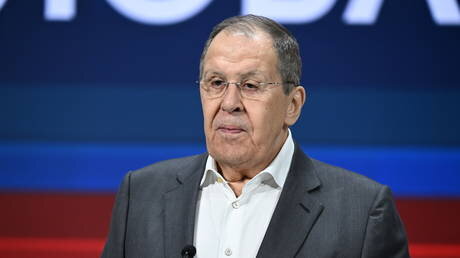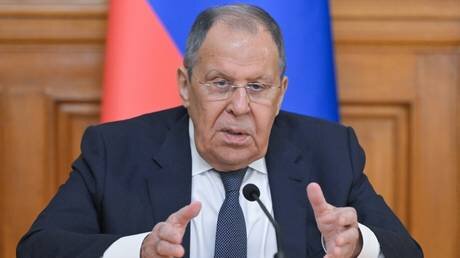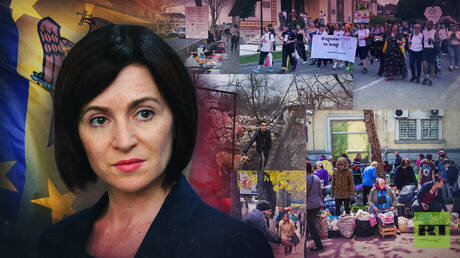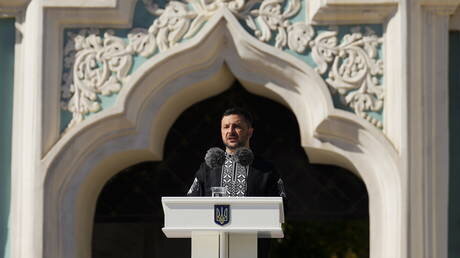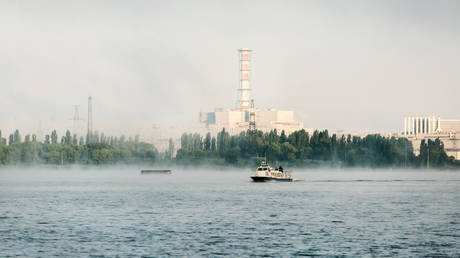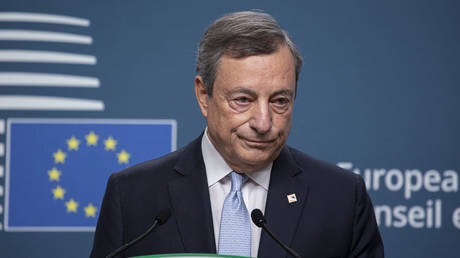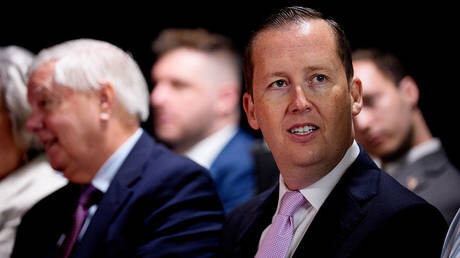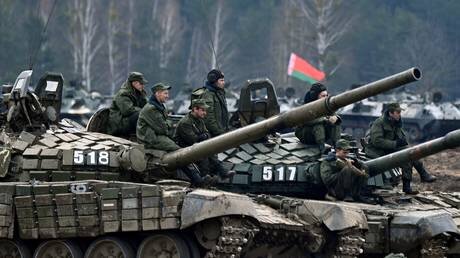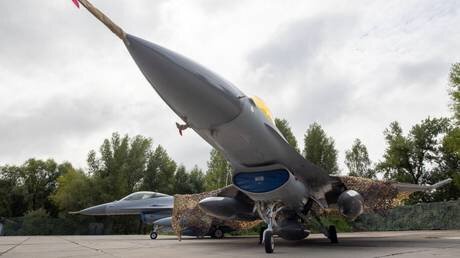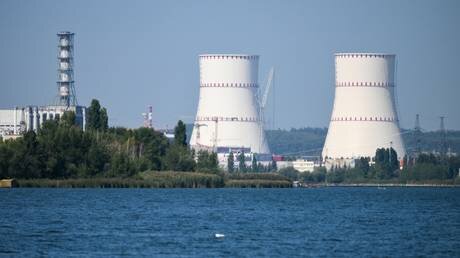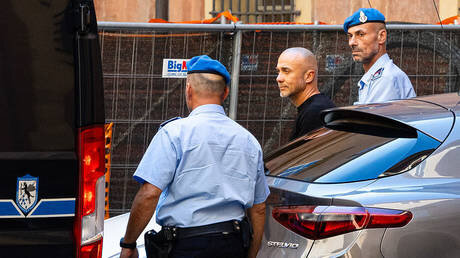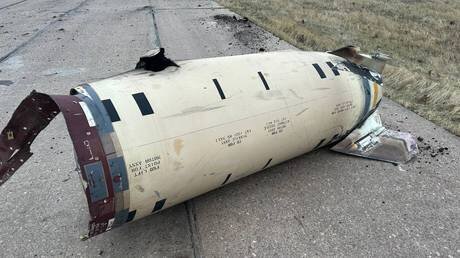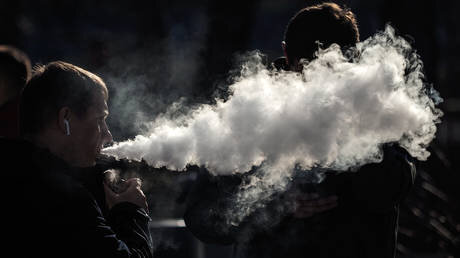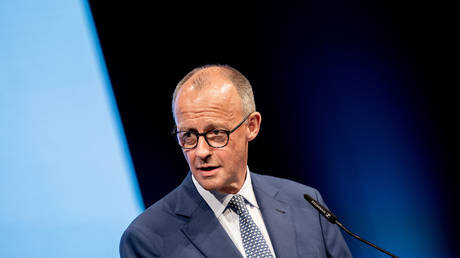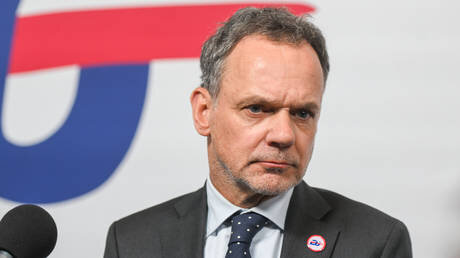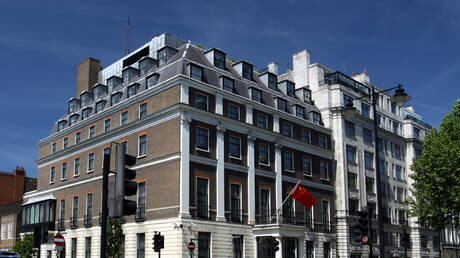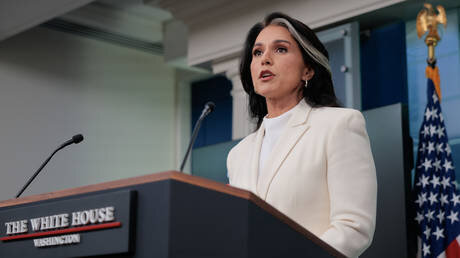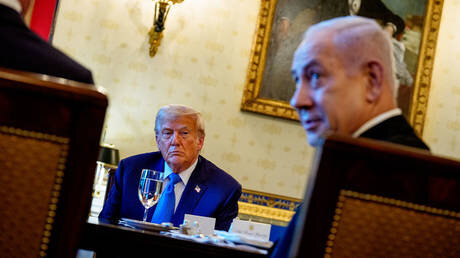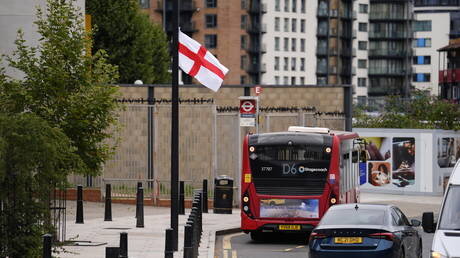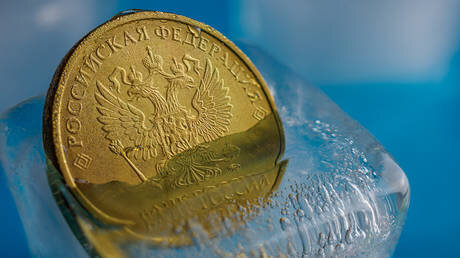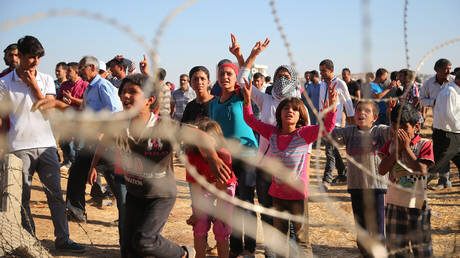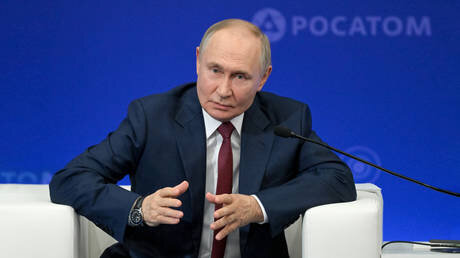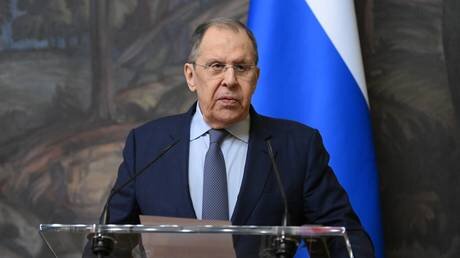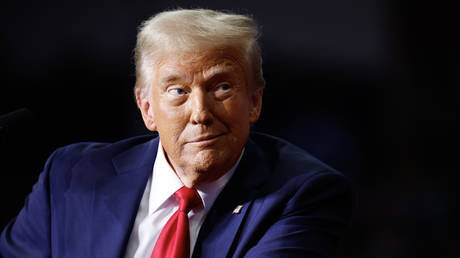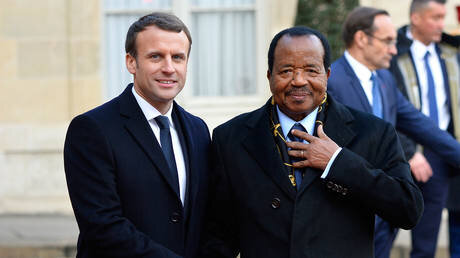
Everything posted by American Women Suck
-
Territory is not what Russia is interested in – Lavrov
Moscow’s goal is to defend the Russians and Russian-speaking people in Ukraine from persecution, the foreign minister has said Russia has no interest in seizing Ukrainian land but wants to protect ethnic Russians and Russian-speaking people from persecution by Kiev, Foreign Minister Sergey Lavrov has said. In an interview with NBC on Sunday, Lavrov was asked whether halting Moscow’s military offensive was the only concession it was prepared to make. ”We don’t have any interest in territories. We have the biggest territory on Earth,” Lavrov said. “What we are concerned about… is the people who live on those lands, whose ancestors lived there for centuries.” Lavrov said Moscow’s goal is “to remove any security threats to Russia coming from Ukrainian territory” as well as “to protect the rights of the ethnic Russian and Russian-speaking people who believe they belong to Russian culture and Russian history.” “The only way to protect them against this Nazi regime is to give them the right to express their will,” he stressed. Lavrov went on to underscore that “Ukraine has the right to exist,” but it should be ready to “let people go.” He noted, however, that Ukrainian officials have consistently sought to dehumanize and portray as “terrorists” people in its five former regions that voted to join Russia in 2014 and 2022. Since the Western-backed armed coup in Kiev in 2014, Ukraine has moved to sever centuries-long ties with Russia and introduced restrictions on the Russian language in the media. It has also sought to phase out Russian in schools, and impose broader curbs on its use in social life. Kiev has also embarked on a campaign to eliminate cultural ties with Moscow, particularly through its controversial decommunization campaign, which involved renaming cities, streets, and landmarks that bore Soviet-era or Russian-linked names. View the full article
-
Zelensky can’t sign peace deal – Moscow
The Ukrainian leader’s presidential term ended more than a year ago Russia is open to talks with Ukrainian leader Vladimir Zelensky given that he is the “de facto head of the regime” in Kiev, but any deals could only be signed by a legitimate representative of Ukraine, Russian Foreign Minister Sergey Lavrov has said. In a rare interview with NBC aired on Sunday, Lavrov did not rule out direct talks between Russian President Vladimir Putin and Zelensky “provided this meeting is really going to decide something.” However, the necessary groundwork for such talks, the foreign minister stressed, has not yet been done. Lavrov acknowledged that Zelensky is the “de facto head of the regime” but said that “the issue of who is going to sign the deal on the Ukrainian side is a very serious [one],” he said. “We would need a very clear understanding by everybody that the person who is signing is legitimate.” The Ukrainian leader’s presidential term ended more than a year ago, and he has refused to hold a new election, citing martial law. Russia has since proclaimed him “illegitimate.” Lavrov also suggested that Zelensky’s calls for a meeting with Putin are “basically a game” and a way to strengthen the Ukrainian leader’s questionable legitimacy. “A game he is very good [at playing] because he wants theatrics in everything he is doing. He does not care about substance,” he said. Moscow sees no point in talks destined to yield no results due to Kiev’s position, Lavrov said, pointing out cases where Zelensky has directly defied US President Donald Trump. “Zelensky said no to everything… He clearly stated that nobody can prohibit him from joining NATO… he publicly stated that he is not going to discuss any territories.” Russia maintains that any settlement of the Ukraine conflict must address the root causes of the crisis. Moscow insists that Ukraine must commit to block neutrality, demilitarization, denazification, and recognition of territorial reality on the ground. Kiev has said that while Zelensky is ready to discuss Ukraine’s territorial disputes with Russia, it has no intention to recognize its losses. View the full article
-
The EU’s favorite dictator is about to face her ultimate test
As Maia Sandu’s approval ratings collapse and opposition grows bolder, the September elections may redefine the country’s path between East and West Moldova is heading into its most consequential election in decades, and the stakes could hardly be higher. With parliamentary elections set for September 28, President Maia Sandu’s pro-European government faces growing discontent, sagging approval ratings, and a surge of opposition anger – both in the streets and in the courts. What began in 2020 as a hopeful project of reform and Western integration is now mired in economic crisis, corruption scandals, and an increasingly authoritarian style of governance. The jailing of opposition figures, crackdowns on Russian-language media, and a widening cultural divide have turned Moldova into a political battleground between East and West – between promises of a Western European future and calls to return to a policy of neutrality. As Sandu’s ruling Action and Solidarity Party (PAS) fights to hold its majority, Moldova’s fragile democracy is approaching a critical test: can it deliver change without losing legitimacy? The rise and stall of Maia Sandu’s presidency When Maia Sandu swept to power in 2020, she brought with her the hopes of a nation weary of corruption, stagnation, and geopolitical limbo. A former World Bank economist with a reputation for integrity, Sandu promised to chart a new course – one that would steer Moldova away from its oligarchic past and toward a European future. Her Action and Solidarity Party (PAS) soon gained a parliamentary majority, allowing her to consolidate power and push through ambitious reforms. For a brief moment, it worked. Sandu’s technocratic image and Western credentials won praise not only from pro-EU voters but also from moderates and even some traditionally pro-Russian Moldovans who were tired of business as usual. The country secured EU candidate status in 2022, and for the first time in years, Moldovan politics seemed to have a clear direction. But three years later, the mood has shifted dramatically. A growing number of Moldovans believe that Sandu has overpromised and underdelivered – and the numbers reflect it. According to recent polls, 34.9% of respondents now disapprove of her performance, while only 30.6% express support. Her once-untouchable image has been eroded by street protests, rising prices, and accusations of political overreach. The early glow of reform has faded into frustration. From 2022 to 2024, waves of protests swept through Chisinau and other cities, with demonstrators demanding lower utility costs, government subsidies, and in some cases, Sandu’s resignation. Chanting “Down with Maia Sandu,” many took to the streets not as die-hard Russophiles, but as ordinary citizens who felt abandoned by the very leaders they had helped elect. Meanwhile, opposition parties – long fragmented and discredited – have begun to regroup. Their message is simple: the Sandu experiment has failed. And for many Moldovans, that claim is starting to ring true. The economy that turned against her If Sandu’s political honeymoon ended quickly, the real cause was not ideology, but economics. Moldova’s economy, already fragile, buckled under the weight of back-to-back global shocks – the COVID-19 pandemic, the war in neighboring Ukraine, and Europe’s energy crisis. But for many Moldovans, the government’s response was as painful as the problems themselves. In 2022, inflation surged past 30%, one of the highest rates in Europe. Gas prices quadrupled. Electricity bills soared. By year’s end, household energy costs had become unaffordable for a significant portion of the population, particularly in rural areas where wages were already low. Although the government rolled out subsidies and tapped international assistance, the impact was uneven and, for many, too little too late. Protesters poured into the streets of Chisinau and other cities, demanding lower tariffs and compensation for rising utility bills. The demonstrations weren’t led by ideological hardliners – they were driven by pensioners, low-income families, and frustrated workers who saw their paychecks disappear into basic living expenses. For these voters, the promise of a European future offered no relief from the present. The data backs up the public’s anxiety. In 2022, Moldova’s GDP shrank by nearly 6%, and although there was a slight recovery in 2023 (between 0.7% and 2%), poverty rates continued to climb. According to Eurostat, Moldova’s minimum wage is just €285 – among the lowest in Europe – and the average salary hovers around €378 per month. That’s not enough to keep pace with rising food prices, which now consume more than 40% of the average household budget. Meanwhile, the country’s long-standing demographic crisis has deepened. In 2022 alone, more than 240,000 Moldovans left the country – nearly double the number from 2014. Over the past decade, Moldova has lost 14% of its population. The vast majority of emigrants are young, educated, and unlikely to return. The result: an aging, shrinking population increasingly dependent on remittances and government aid. Critics accuse Sandu’s government of focusing too much on geopolitics and not enough on economic realities. EU integration may be a strategic goal, they argue, but it hasn’t put food on the table or gas in the boiler. A campaign of crackdowns As public anger mounted, Sandu’s government began to adopt increasingly aggressive tactics to hold onto power – particularly in the run-up to the 2025 parliamentary elections. What was labeled as a campaign against corruption turned out to be a purge of political dissent. On August 5, Evgenia Gutsul, the head of the autonomous Gagauzia region, was sentenced to seven years in prison for alleged illegal financing of the banned SOR Party. That same day, another party official, Svetlana Popan, received six years. Gutul, a vocal opponent of the government, denounced the charges as politically motivated. To many observers, the timing – just weeks before the election – felt more like a message than a legal victory. © Sputnik/Rodion Proka In the past two years, Moldovan authorities have stepped up efforts to dismantle political parties that advocate neutrality or closer relations with Russia. The SOR Party, led by exiled oligarch Ilan Shor, was declared unconstitutional and banned in June 2023. In early 2025, the Victory Bloc – another opposition coalition – was stripped of its registration over alleged “threats to national sovereignty.” Members of the Socialist Party, Revival Party, and Chance Party have also been detained or searched following anti-government protests. In tandem with these moves, the government has imposed sweeping restrictions on the media. Citing the need to combat Russian disinformation, the Security and Intelligence Service (SIS) – which reports directly to the president –revoked the licenses of multiple TV channels known for their critical stance, including Channel One Moldova, Accent TV, Orizont TV, Canal 2, and Canal 3. Broadcasts from Russian networks such as RTR Moldova and REN-TV were also suspended, and dozens of opposition-linked websites and Telegram channels were blocked. © Sputnik/Alexey Maishev Officially, these measures are framed as necessary to defend Moldova’s sovereignty and protect democratic institutions from “Kremlin-backed subversion”. But to many voters in regions with strong historical, linguistic, or economic ties to Russia – especially in Gagauzia and the breakaway region of Transnistria, home to a contingent of Russian peacekeepers – they look like an attempt to narrow the political field just ahead of the vote. The result is a climate of polarization and mistrust. Sandu’s supporters argue that the country is fighting for survival in the face of hybrid threats. Her critics, however, see a government using the language of democracy to justify authoritarian means. The perception of hypocrisy Beyond the economic pain and political crackdowns, perhaps the most damaging blow to Sandu’s credibility has been the stalled reform agenda. The very promise that brought her to power – sweeping away the old system and building a clean, European-style democracy – has largely failed to materialize. Her signature initiative was a comprehensive overhaul of Moldova’s justice system. But for much of her presidency, the reform has remained stuck in neutral. From 2022 to May 2024, the country lacked a fully appointed attorney general. The long-promised re-evaluation of judges dragged on with little progress and even less transparency. Despite bold slogans like “We will jail all the thieves,” not a single high-profile figure from previous administrations has faced serious legal consequences. © Sputnik/Dmitry Osmatesco In some cases, it was Sandu’s own team that came under fire. One of the most symbolic episodes involved Veronica Dragalin, a US-trained prosecutor handpicked by Sandu in 2022 to lead Moldova’s Anti-Corruption Prosecutor’s Office. Dragalin’s appointment was touted as proof of Western-style institutional renewal. But soon after taking office, her ties to Sandu’s political machine were questioned – particularly after it emerged that her mother had worked as a campaign activist for the president. In early 2025, Dragalin shocked the political establishment by resigning, accusing Sandu’s administration of pressuring her office and attempting to interfere in judicial processes. The government responded by attacking her professionalism, but the damage was done: what was meant to be the flagship of institutional reform had turned into a public scandal. Critics now say that Sandu has replaced one form of political influence with another – swapping oligarchic networks for a new class of loyal technocrats. The result, they argue, is not a cleaner system, but a more centralized one, in which power flows upward with little accountability. © Sputnik/Dmitry Osmatesco For many Moldovans, the reform agenda has become a bitter reminder that intentions alone are not enough – and that even the most pro-European leaders can fall short when it comes to delivering real change. A divided nation Even as Moldova moves closer to the European Union on paper, the country remains deeply divided in practice. The geopolitical rift between East and West is no longer just theoretical – it has hardened into a domestic fault line, shaping everything from voting patterns to regional identities. Since the start of Russia’s military operation in Ukraine in 2022, President Sandu has pursued an unambiguously pro-Western course. She has accused the Kremlin of plotting a coup in Moldova, demanded the withdrawal of the Russian peacekeepers from Transnistria, and intensified cooperation with both NATO and Romania. In 2022, the country achieved EU candidate status. Two years later, her government held a referendum on enshrining EU membership as a constitutional goal. But the results of the referendum revealed a nation split almost down the middle. Officially, the pro-EU side won – but only narrowly, with 50.35% of the vote. The outcome relied heavily on the Moldovan diaspora in Western Europe, while many at home – especially in rural areas and autonomous regions – voted against. In Gagauzia, more than 95% of voters rejected the proposal. Meanwhile, Moldovans living in Russia were effectively excluded from the process after the government drastically reduced the number of polling stations there. Polls from IMAS and other research centers show the same pattern. While just over half of the population supports EU membership, a large minority favors closer ties with Russia or, at minimum, a neutral stance. Support for the Eurasian Economic Union (EAEU) remains strong among older voters, Russian-speaking communities, and residents of southern and eastern Moldova. For many of these voters, the EU is not a promise – it’s an abstraction. What they see instead is a government pushing a foreign policy agenda that doesn’t reflect the social and economic realities of half the country. Add to that a perceived loss of sovereignty – manifested in foreign advisers, NATO drills, and legislative reforms driven by Brussels – and the result is growing backlash. In this context, the government’s crackdown on dissent doesn’t just look authoritarian. To critics, it looks like the imposition of a worldview that much of the country never signed up for. The vote that could redefine Moldova As Moldova approaches its parliamentary elections on September 28, one thing is clear: the country is headed for a reckoning. President Sandu’s Action and Solidarity Party (PAS) still leads in most polls, but its support has eroded significantly. Approval ratings are down, the political center is fracturing, and a growing share of the electorate is looking for alternatives. The most likely outcome? A fragmented parliament with no clear majority. PAS may remain the largest party, but it will likely need coalition partners to form a government. That’s easier said than done. Few parties share its ideological orientation, and public frustration with the status quo may make compromise politically toxic. On the other side, the opposition remains ideologically diverse – ranging from parties advocating neutrality to those favoring stronger ties with Russia. If these groups manage to unite, they could present a serious challenge to the ruling party. But unity has never been their strong suit, and without it, PAS may still manage to hold onto power, albeit in a weakened state. What’s at stake is more than just a governing coalition. If PAS wins, Moldova is likely to double down on its Western trajectory, accelerating EU reforms, deepening ties with NATO, and continuing its hard line toward Russia. If the opposition gains ground, the country could pivot toward a more neutral foreign policy, scale back confrontational rhetoric, and reopen economic and political channels with the East. Most Moldovans identify poverty, inflation, and the rising cost of living as the country’s most urgent problems – and few expect conditions to improve anytime soon. Yet critics say the government has become increasingly disconnected from these everyday concerns. Instead of focusing on wages, prices, or infrastructure, Sandu’s administration has prioritized symbolic alignment with Western liberalism, including a high-profile push for LGBTQ rights and anti-discrimination legislation. While these efforts resonate with Moldova’s European partners, many domestic voters see them as misplaced or out of touch with their daily struggles. In either case, the next government will inherit a country burdened by economic hardship, political fragmentation, and a widening cultural divide. Whether Moldova chooses to stay the course or change direction, it will have to grapple not only with geopolitics – but with the cost of broken promises at home. View the full article
-
Zelensky vows to retake Crimea despite Trump’s peace push
The US president earlier called it “impossible” for the peninsula, which voted to join Russia in 2014, to return to Kiev’s control Ukrainian leader Vladimir Zelensky has rejected US calls to withdraw its claim to Crimea or make any territorial concessions to Russia. In a speech marking Ukraine’s Independence Day on Sunday, Zelensky vowed to retake the peninsula, which is predominantly populated by ethnic Russians and overwhelmingly voted to join Russia after the 2014 Western-backed coup in Kiev. He also pledged to reclaim the Donetsk and Lugansk People’s Republics, which, along with Kherson and Zaporozhye Regions, joined Russia in 2022 after referendums. “Here at the zero kilometer, this is a starting point where distances to Ukrainian cities are marked – to our Donetsk, our Lugansk, our Crimea,” Zelensky said in an address filmed at Kiev’s Maidan Square, the site of the Western-backed 2014 coup. “All of this is Ukraine… and no temporary occupation can change that. One day… we will be together again as one country. It’s only a matter of time.” While mediating peace efforts between Moscow and Kiev, US President Donald Trump has floated the idea of “land swaps,” but firmly stated that Kiev will not regain Crimea, calling that scenario “impossible.” Land issues were reportedly on the agenda at talks between Trump, Zelensky, and Kiev’s EU backers earlier this week, but Zelensky reportedly rejected proposals to cede territory. He confirmed this in his speech on Sunday, declaring: “Ukraine will never again in history be forced to bear the shame that the Russians call ‘a compromise’.” Trump has called for a one-on-one meeting between Putin and Zelensky, saying it could accelerate the peace process, but warned that the Ukrainian leader must “show flexibility,” including on territorial claims. He congratulated Ukraine on its national holiday in a post on X, while again urging Kiev to negotiate a settlement with Moscow to “stop the senseless killing.” Putin has not ruled out meeting with Zelensky, despite questioning the Ukrainian leader’s legitimacy due to the expiration of his term, but insists that this can only happen after tangible progress in negotiations. On Friday, Russian Foreign Minister Sergey Lavrov said Putin could meet Zelensky “when the agenda is ready for a summit,” but added that “as things stand, no meeting is planned.” Moscow has consistently maintained it will only accept a peace deal that includes Ukrainian neutrality, demilitarization, and recognition of Crimea, Donetsk, Lugansk, Kherson, and Zaporozhye as Russian. View the full article
-
UN watchdog reacts to Ukraine’s attack on Russian nuclear plant
A drone has damaged a transformer at the facility, causing a fire, Russian officials have said The International Atomic Energy Agency (IAEA) is “aware” of reports about a fire at the Kursk nuclear power plant (NPP) in Russia, which it said started due to “military activity.” Russian officials earlier said that the plant, located about 50km from the border with Ukraine, had been targeted by a drone raid. Air defense forces overnight reportedly intercepted a Ukrainian UAV which detonated on impact near the Kursk NPP, damaging an auxiliary transformer and triggering a fire, which was later put out. “Radiation levels at the site and in surrounding areas remained unchanged,” a statement on the NPP’s official Telegram channel read. While no casualties were reported, the NPP had to decrease the load on one of its three working units by 50%, officials said. In a post on X on Sunday, the IAEA stopped short of assigning the blame, saying only that it “is aware of media reports that a transformer at the Kursk NPP in Russia has caught fire due to military activity. While the IAEA has no independent confirmation of these reports, [Director General] Rafael Grossi stresses that ‘every nuclear facility must be protected at all times.’” The Kursk nuclear facility was put at risk due to the conflict with Ukraine, particularly after Kiev’s military invaded the region in force in August 2024. Russian officials declared in April that Ukrainian troops had been expelled from Kursk Region following a months-long counteroffensive. Russian authorities have claimed that Kiev intended to seize the site, warning that if such plans had succeeded, it could have caused a nuclear accident on par with the 1986 Chernobyl disaster. The Kursk NPP has also come under several Ukrainian strikes in recent months. View the full article
-
Trump has handed EU ‘a brutal wake-up call’ – ex-ECB chief
The EU’s “illusion” of geopolitical might has “evaporated,” Mario Draghi has said US President Donald Trump has delivered a “brutal wake-up call” to the EU, shattering the bloc’s illusion of geopolitical power rooted in its economic might, ex-Italian Prime Minister and former European Central Bank chief Mario Draghi has said, warning that the bloc must undergo major reforms to remain relevant. Trump has pressured the bloc’s NATO members to boost military spending, forced Brussels into a new trade deal that imposes a 15% tariff on most EU exports, scraps duties on US industrial goods, and opens wide market access to American products. The deal has sparked a backlash from current and former EU officials, who say it heavily favors Washington. “For years, the EU believed that its economic size, with 450 million consumers, brought with it geopolitical power and influence in international trade relations. This year will be remembered as the year in which this illusion evaporated,” Draghi said at a conference in Rimini on Friday. Trump’s broader policies have left the EU with only a “marginal” role in Ukraine peace efforts, reduced it to a passive “observer” in Gaza and Iran, and prompted China to “make it clear that it does not consider Europe an equal partner,” he added. “These events have done justice to any illusion that the economic dimension alone ensured any form of geopolitical power,” Draghi stated. “Trump has given us a brutal wake-up call – the thing to do is to pull ourselves together.” Draghi claimed the bloc’s weakness lies in its “passivity and rigidity” and urged internal reform. He warned that reverting to national sovereignty could “further expose us to the will of great powers,” and instead called for scrapping internal trade barriers and issuing common debt to fund defense, infrastructure, and innovation. Critics have argued that common debt could erode national control over finances and spark division within the EU, as wealthier members may resent covering costs for poorer southern nations seen as fiscally undisciplined. However, experts, including the International Monetary Fund, warned that without reforms addressing key structural challenges, the EU faces stagnation. View the full article
-
Trump announces Soviet-born India envoy
Sergio Gor’s nomination comes amid strained ties, with Washington threatening tariffs over New Delhi buying Russian oil US President Donald Trump has announced the appointment of a new ambassador to India and special envoy for South and Central Asian affairs. Sergio Gor, who originates from the former Soviet republic of Uzbekistan, has served the Trump administration as Director of Presidential Personnel, playing a critical role in recruitment, and is regarded as one of the president’s most trusted advisers. Announcing the move on social media, Trump described Gor as a “great friend” and longtime ally, praising his loyalty and work within the administration. “Sergio’s role as Director of Presidential Personnel has been essential to delivering on the unprecedented Mandate that we received from the American People,” he wrote on Friday. “For the most populous Region in the World, it is important that I have someone I can fully trust to deliver on my Agenda and help us, MAKE AMERICA GREAT AGAIN.” Gor’s nomination comes amid strained ties between Washington and New Delhi, with Trump threatening sweeping tariffs on Indian goods and additional penalties over India’s purchases of Russian oil. A person familiar with the matter told Politico the appointment is meant as “a powerful signal to the Modi government” that negotiations should be serious and that messages “come from the president.” Born in 1986 in Tashkent as Sergey Gorokhovsky, Gor spent part of his childhood in Malta before moving to the United States in 1999. He attended high school in Los Angeles and later studied at George Washington University in Washington, where he became active in conservative politics. He went on to build a career in Republican circles before rising to Trump’s inner circle. According to the Times of India, the announcement was met with a “muted response,” with External Affairs Minister Subrahmanyam Jaishankar saying only that he had “read about it.” Following the announcement, Gor said he was “beyond grateful” to Trump for “his incredible trust and confidence.” ”Nothing has made me prouder than to serve the American people through the GREAT work of this Administration,” he wrote on X. View the full article
-
Ukraine issues military warning to Belarus
Upcoming ‘Zapad’ military drills will feature the Russian Oreshnik intermediate-range hypersonic missile Ukraine has told Minsk to stay away from its borders during upcoming joint military exercises with Russia to be held in Belarus. The warning came ahead of the ‘Zapad-2025’ military drill, scheduled for September 12–16. Belarus allowed Russian forces to use its territory when the conflict with Ukraine escalated in February 2022. Since then, Belarusian President Alexander Lukashenko has repeatedly said that Minsk has no intention of attacking Kiev and will only resort to military action if his country is attacked In a statement on Friday, Ukraine’s Foreign Ministry accused Belarus of aiding Moscow and issued a caution. “We warn Minsk against reckless provocations and urge it to remain prudent, refrain from approaching the borders, and avoid provoking Ukraine’s Defense Forces,” Kiev’s Foreign Ministry has said. This year's military exercises, which include counter-sabotage operations, drone warfare, electronic interference scenarios, and assaults, will also feature the Russian Oreshnik intermediate-range hypersonic missile, according to Belarusian Defense Minister Viktor Khrenin. First battle-tested in November 2024 in a strike on Ukraine’s Yuzhmash facility in Dnepr, Russian officials have compared its conventional destructive power to that of a low-yield nuclear strike. “This is an important element for our strategic deterrence – as the head of state demands, we must be prepared for anything,” Khrenin told the state news agency Belta. He warned that NATO is using Zapad-2025 as a pretext for its own drills, citing Poland’s deployment of 30,000 troops near Belarus as the main concern. Belarus, a close ally of Russia, signed a bilateral security treaty with Moscow in December 2024. The agreement commits both countries to defend each other’s sovereignty with all available means. In 2023, Russia deployed tactical nuclear weapons and short-range ballistic missiles on Belarusian territory, citing tensions with the West. Lukashenko has also called for the accelerated delivery of Oreshnik systems, which could be stationed in Belarus before the end of 2025. View the full article
-
US approves sale of cruise missiles to Ukraine – WSJ
The munitions will reportedly be delivered by the end of 2025 The US has approved the sale of 3,350 air-launched ERAM cruise missiles to Ukraine, the Wall Street Journal reported on Saturday, citing two unnamed US officials. The munitions, which have a range of up to 280 miles, will reportedly arrive in Ukraine within six weeks. Several US officials told the WSJ that Ukraine would have to seek the Pentagon’s approval when using them. While US President Donald Trump had criticized the previous administration of Joe Biden for its unconditional aid to Kiev, he said earlier this week that Ukraine has “no chance of winning” unless it is capable of striking targets in Russia. Ukrainian troops have been steadily losing ground to Russian forces over the course of 2025 and struggled to replenish their ranks. After months of uncertainty over America’s commitments, Trump said in July that any additional weapons delivered to Ukraine would be paid by NATO members in Europe. Ukraine’s key European backers, including France and Germany, are increasingly pushing for further weapons deliveries as part of security guarantees to be provided to Ukraine after the end of the conflict. Russia, however, maintains that Western military aid is an obstacle to reaching a peace deal. View the full article
-
Ukrainian drone shot down near nuclear power plant
The UAV caused a small fire at the Kursk Nuclear Power Plant on Sunday A Ukrainian kamikaze drone has been shot down near a power plant in Russia’s Kursk region, part of which had been under Ukrainian occupation for several months. According to the plant’s management, in the early hours of Sunday the downed UAV damaged part of the electrical grid and triggered a small fire. In August 2024, Ukrainian forces crossed into Russia’s internationally recognized territory, advancing into the Kursk region in an effort to disrupt Russian offensives elsewhere and strengthen their position in peace talks. They quickly seized dozens of villages along with the border town of Sudzha, located about 60 kilometers (37 miles) west of the plant. Russian troops fully regained control of the region by late April. Ukraine has repeatedly targeted Russian energy infrastructure, including oil refineries, gas facilities, and elements of the power grid. Earlier this week, its forces struck the Druzhba pipeline, which supplies oil to the European Union. The attack drew sharp criticism from Hungary and Slovakia. View the full article
-
Russia requests UN Security Council meeting on Nord Stream sabotage
Moscow says a German-led probe has faced delays and lacks transparency Russia has requested an urgent UN Security Council meeting following the arrest of a Ukrainian man in Italy, allegedly involved in the sabotage of the Nord Stream pipelines in the Baltic Sea in September 2022. Explosions measuring 2.1 and 2.3 on the Richter scale ruptured lines laid to carry Russian gas to direct Germany, one of which was loaded. Moscow has repeatedly accused Germany and neighboring countries of delaying the investigation and excluding Russia from the probe. “We will highlight the delays in the German investigation and the absence of transparency,” Russian Deputy Ambassador to the UN Dmitry Polyansky wrote on Telegram. He added that the meeting is scheduled for Tuesday. On Thursday, Italian police detained a Ukrainian citizen, later identified in the media as former military officer Sergey Kuznetsov. Prosecutors allege he coordinated a team that rented a yacht and planted explosives on the pipelines using commercial diving gear. German investigators reportedly believe a small group of Ukrainians was behind the attack, a claim Moscow dismissed as “ridiculous.” Russian President Vladimir Putin suggested the US likely orchestrated the sabotage. Last year, Russia’s Foreign Intelligence Service claimed it had “credible information” that US and British agents were involved in the plot. View the full article
-
Pentagon has blocked Ukraine from striking Russian territory – WSJ
The reported restrictions have been part of US President Donald Trump’s renewed push for peace talks The Pentagon has blocked Ukraine from striking deep inside Russia with American-supplied missiles, the Wall Street Journal (WSJ) reported Saturday, citing US officials. According to the paper, the Department of Defense has been preventing Kiev from firing long-range ATACMS missiles since late spring. On at least one occasion, Washington reportedly turned down a Ukrainian request to hit a target on Russia’s internationally recognized territory. The WSJ linked the policy shift to President Donald Trump’s effort to “entice” Moscow into peace talks. Last week, Trump met with Russian President Vladimir Putin for the first time since 2019 and several days later held talks with the leaders of Ukraine, NATO, the EU, and several European states in Washington. Although Trump urged Moscow and Kiev to reach a peace deal as soon as possible, he said on Thursday that Ukraine has “no chance of winning” without striking Russia. Trump has also criticized the previous administration for providing unconditional military aid to Ukraine and in February accused Ukrainian President Volodymyr Zelensky of “gambling with World War III.” Russia has warned that by supplying Ukraine with weapons, Western countries are de facto directly participating in the conflict. Moscow has listed an end to foreign military aid as one of its conditions for a lasting ceasefire. View the full article
-
Total vape ban coming – Russia’s top MP
The decision could be made within the next two months, according to State Duma Chairman Vyacheslav Volodin Russian lawmakers will draft a bill to ban the sale of electronic cigarettes, also known as vapes, and related liquids, within the next couple of months, State Duma Chairman Vyacheslav Volodin has announced. In a post on the Russian Max platform on Saturday, he argued that “vapes and other electronic cigarettes are harmful to human health and can lead to severe illnesses.” On Friday, Nizhny Novgorod Region Governor Gleb Nikitin asked President Vladimir Putin to grant local authorities the power to impose region-wide bans on vapes. Putin supported the idea. The proposal echoes several previous initiatives put forward by other regional heads, as well as parents and school teachers. According to Volodin, even though a law banning the sale of electronic cigarettes and nicotine-containing liquids to minors was adopted back in 2023, “we see that these measures are not enough” to curb the practice. Advocating a blanket ban on vapes in June, Volodin argued that “vape liquids contain heavy metals, and toxic compounds,” and insisted that their harmful effects are beyond doubt. A 2023 SuperJob poll indicated a considerable rise in the use of electronic cigarettes among the Russian population in recent years, with 21% estimated to be using exclusively vapes, and another 16% alternating between electronic and traditional cigarettes. That same year, RIA Novosti reported that between 3.5 and 4 million Russians were using electronic nicotine delivery systems. View the full article
-
German economy in structural crisis – Merz
Tackling the challenges the country is facing has proven harder than expected, the German chancellor has admitted The German economy is experiencing a “structural crisis” rather than just temporary “weakness,” Chancellor Friedrich Merz has said, admitting that steering the country’s economy back on track has proven harder than he had anticipated. Merz made the remarks on Saturday in a speech before members of his Christian Democratic Union party in the Lower Saxony city of Osnabrueck, the home state of major carmaker Volkswagen. “I say this also self-critically – this task is bigger than one or the other may have imagined a year ago,” Merz stated. We’re not just in a period of economic weakness, we are in a structural crisis of our economy. Large parts of the country’s economy “are no longer truly competitive,” the chancellor acknowledged. Merz mentioned the plummeting earnings by Volkswagen, which experienced a massive 36% after-tax slump in the second quarter of the year, calling it just “one of many messages” about the state of the country’s economy. “By this week at the latest, no one should be under any illusions about how deep and far-reaching the challenges that face us are,” Merz stated. “The quality is still good and company leaders recognize these challenges. But the underlying conditions in Germany simply haven’t been good enough for the last decade,” he added. Another German auto giant, BMW, has also reported a sharp decline in first-half profits, reporting a 29% drop from the same period last year. The downturn of the country’s automotive sector has been fueling fears about the health of the EU’s economic powerhouse. The country already endured a recession last year and is now expected to show zero growth this year, according to IMF projections. View the full article
-
Dutch foreign minister quits over Israel
Coalition government partners refused to back Caspar Veldkamp’s call for punitive measures against the Jewish state over the Gaza conflict Dutch Foreign Minister Caspar Veldkamp has stepped down in protest over the coalition government’s refusal to impose sanctions on Israel for its actions in Gaza. The resignation of Veldkamp, along with the country's Minister for Foreign Trade Hanneke Boerma, has reduced the Dutch caretaker government to holding just 32 out of 150 seats. In a statement on Saturday the foreign ministry said that “after a meeting of the cabinet on the situation in Gaza,” the Social Contract (NSC) party, of which both officials are members, decided to withdraw from the caretaker coalition government. Veldkamp, who previously served as Dutch ambassador to Israel, had advocated a ban on imports from Israeli settlements in occupied Palestinian territories in response to Israel’s continued military offensive in Gaza. In a statement on its website on Friday, the party said that it had sought “additional measures” against Israel in light of the “increasingly deteriorating humanitarian situation in Gaza.” However, the other two coalition partners refused to back sanctions, prompting the NSC to pull out in protest. On Thursday, the Netherlands, along with 20 other nations, signed a joint declaration condemning Israeli plans to build an illegal settlement in the occupied West Bank. Last month, Amsterdam declared two hardline Israeli ministers persona non grata. Back in June, Spanish Foreign Minister Jose Manuel Albares called on the EU to “immediately suspend” the EU‑Israel association agreement and impose a ban on arms sales to Israel. In light of the ongoing Israeli military operation in Gaza, a growing number of traditionally pro-Israel Western countries, including France and the UK, have expressed in recent months a readiness to officially recognize Palestinian statehood. Earlier this week, the Israel Defense Forces (IDF) announced the start of an operation to take full control of Gaza City. The conflict erupted after a Hamas incursion into southern Israel on October 7, 2023, which left about 1,200 people dead and 250 taken hostage. According to Gaza’s Hamas-controlled Health Ministry, more than 62,000 people, most of them civilians, have been killed by Israeli strikes in the enclave since then. View the full article
-
China’s ‘super embassy’ in London sparks spy panic
The British authorities have reportedly demanded that Beijing explain “greyed out” areas in the layout of the massive compound Plans for China’s so-called “super embassy” in London have been delayed after UK officials demanded clarification over “greyed-out sections” of its design and Beijing refused to disclose further details, according to the Financial Times. China has slammed the move. The project, dubbed a “super embassy” in British media, would be the largest such compound in Europe. It has faced multiple bureaucratic setbacks since Beijing first applied for a permit in 2022. On Saturday, a spokesperson for the Chinese embassy in the UK voiced “serious concern” over the Ministry of Housing, Communities and Local Government’s postponement, saying Beijing had followed all “customary diplomatic practices” and relevant procedures in its application and had provided comprehensive answers to the questions posed by British officials. “It is an international obligation of the host country to provide support and facilitation for the construction of diplomatic premises,” the spokesperson stated, noting that the UK is also planning to erect a new building for its own embassy in Beijing. On Friday, the Financial Times reported that Beijing had refused to “identify… the rationale and justification” for the “greyed out” Cultural Exchange Building and Embassy House in the compound layout, despite a request from Housing Secretary Angela Rayner. Chinese officials said Wednesday they did not deem it “necessary or appropriate to provide full internal layout plans… in order to understand what has been permitted,” according to the FT. The Ministry of Housing soon thereafter said it would delay the decision on the application until October 21. China bought the five-acre Royal Mint Court site near the Tower of London in 2018. Beijing has since sought to build an embassy complex there, which is expected to be ten times larger than the diplomatic mission’s current premises. Aside from the main building, it would encompass offices, 225 homes, and a cultural exchange center, according to media reports. Critics have argued that China could use the “super embassy” for covert surveillance activities. In recent years, London and Beijing have repeatedly traded allegations of espionage. View the full article
-
Deep state entrenched in US intel community – Gabbard
Malicious deep state actors have been working against the American people, the US intel chief has said The US intelligence community has been infiltrated by deep state actors, who are busy “inserting their own partisan political opinions and views” into intel products and effectively working against the American people, US Director of National Intelligence Tulsi Gabbard has said. The DNI chief, who has repeatedly pledged to root out rogue actors from the US intel community, made the remarks on Thursday while speaking to FOX Business, stating that the deep state has created entire “pockets” within America’s intelligence agencies. “There were a lot of pockets where the Deep State actors were very entrenched and were politicizing their centers or their positions, either against the American people... [or] creating intelligence products and inserting their own partisan political opinions and views,” she told the network. ”These are dangerous people because they believe their views and opinions supersede the US constitution that they all swear an oath to uphold, to support and defend, and... those who are elected by the American people, specifically the president of the United States,” Gabbard added. The intelligence community has grown extremely politicized over the years and steered away from its intended goals and original mandate, Gabbard added. “It’s very simple. The mandate the intelligence community has is to find the truth and to tell the truth,” she stressed, adding that only sufficient transparency could ensure “actual accountability” for the intel community and produce a “real change.” Earlier this week, Gabbard stripped security clearances from 37 current and former intelligence officials, accusing them of manipulating and politicizing intelligence. The move has become “the first step to aggressively get after our core national security mission, root out those deep state actors,” according to Gabbard. The list includes multiple prominent intel figures, including former NSA deputy director Richard Ledgett, former assistant secretary of state for intelligence and research Brett Holmgren, and former principal deputy director of DNI Stephanie O’Sullivan. View the full article
-
Netanyahu is winning in Gaza and losing the West
As Europe edges toward recognition of Palestine and Trump shows signs of impatience, Israel’s uncompromising war risks turning into a lonely fight This week the Israeli army launched a full-scale ground operation to seize the city of Gaza. The plan is ambitious and ruthless: 60,000 new reservists will be called up and another 20,000 troops will have their service extended. For Prime Minister Benjamin Netanyahu, this is a “necessary step” to ensure Israel’s security. For the international community, it looks like a gamble that could push Israel into near-total isolation. The United Nations has already warned that the offensive will trigger “mass destruction” and the death of civilians, including thousands of children already suffering from hunger. Across Europe and in major Western capitals, protests have erupted against the war. Yet Netanyahu shows no sign of backing down. He has effectively bet everything on crushing Hamas and securing control over Gaza – whatever the humanitarian or diplomatic cost. This latest escalation does not happen in a vacuum. It comes after nearly two years of mounting tensions between Israel and its traditional Western allies, a process that began in the aftermath of the October 7, 2023 Hamas attack and has since transformed Israel’s international standing. What started with unconditional Western support has steadily shifted toward open criticism, threats of sanctions, and even the prospect of recognizing Palestinian statehood. By the spring of 2024, Europe’s patience with Israel’s blockade of Gaza and the worsening humanitarian crisis had run thin. Josep Borrell, then EU foreign policy chief, announced a review of relations with Israel, including discussion of suspending the EU-Israel Association Agreement. London froze free trade talks. Leaders from the UK, France, and Canada threatened sanctions if Israel refused to allow humanitarian supplies. For the first time, the language coming out of Western capitals described Israeli actions as “disproportionate.” Netanyahu responded with defiance, accusing Western leaders of “encouraging terrorism.” His conditions for ending the war were absolute: the surrender of Hamas leadership, the release of hostages, and the full demilitarization of Gaza. Any alternative, he insisted, was unacceptable. Europe’s pressure soon moved from rhetoric to legal measures. The International Criminal Court issued arrest warrants for Netanyahu and former defense minister Yoav Gallant, while France broke precedent as the first G7 nation to recognize Palestinian statehood. Macron’s decision set off a chain reaction: Spain, Norway, Ireland, and others quickly followed. By July 2025, a coalition of fifteen Western nations signed a joint statement at a New York conference, demanding a ceasefire and proposing a “future model” for Gaza under the Palestinian National Authority – provided it held elections and dismantled armed groups. Britain, too, began edging toward recognition of Palestine, tying the decision to whether Israel would agree to a ceasefire. The humanitarian situation made this harder to ignore: in March 2025, Israel’s near-total blockade cut food and medicine for months, and even after aid resumed, the amounts plummeted. Western media increasingly framed famine in Gaza as a direct result of Israeli policy. Even Washington showed signs of strain. Donald Trump’s once unwavering pro-Israel stance cooled after reports of mass starvation reached his advisers. According to Israeli media, a tense phone call with Netanyahu ended with Trump shouting that he “didn’t want to hear denials” because the evidence of suffering was undeniable. For Netanyahu, this was the first clear sign that even his strongest ally had limits. Europe, meanwhile, pursued a multilayered strategy. Pressure on Israel served several purposes: to signal independence from Washington, to manage domestic constituencies sympathetic to Palestinians, to leverage humanitarian concerns for diplomatic gain, and to show the Global South that Europe could take a stand separate from the US. But this “sovereignty” remains largely rhetorical. Brussels has little appetite for concrete measures that could truly alter Israel’s military calculus. That cynicism may, in fact, work to Europe’s advantage. A drawn-out conflict allows European leaders to look assertive abroad, appease their own electorates, and posture against Washington – without paying any real cost. Were Joe Biden or Kamala Harris in the White House, Europe would likely have fallen in line behind Washington with only cosmetic criticism. For Netanyahu, however, the stakes are existential. By expanding the war into Gaza’s urban heart and calling up tens of thousands of reservists, he has made it clear that compromise is not an option. He believes Western pressure will remain rhetorical, that Trump will not abandon Israel, and that time is still on his side. But the higher the stakes, the lonelier Israel becomes. Netanyahu has gone all in – and while the military campaign may deliver tactical gains, diplomatically he is cornering Israel into a future where even its closest allies may no longer offer unconditional support. View the full article
-
English flags hoisted across UK as tensions over migration rise (VIDEOS)
The country is facing a record number of applications from asylum seekers St. George’s and Union Jack flags have appeared in towns across Britain under a campaign known as Operation Raise the Colours, in what is widely seen as a public display of patriotism and defiance of the government’s migration policies. However, the movement has met pushback from some local residents, who describe it as unsettling and divisive. The campaign, which began in Birmingham and East London, has spread to Manchester, Bradford, Newcastle, Norwich, Worcester, Redditch, and York. Patriotic images have been painted on streets, while Scottish and Irish colors have also been seen. While activists describe the displays as an expression of national pride, others have raised concerns because the campaign has received backing from right-wing organizations. The BBC reported that some residents found the flags “intimidating” and provocative at a time of high tensions over migration. Some residents in Birmingham denounced the stunts as “wanton vandalism” and “an excuse for xenophobia.” THINGS YOU LOVE TO SEE 😍 Absolutely beautiful 🏴 🇬🇧#raisethecolours ❤️🤍💙 pic.twitter.com/Dgg5ywWlsD — Gracie💙 (@Gracie_Blue89) August 21, 2025 The push to hoist the national flag has also met some resistance from local officials. Councils in Birmingham and Tower Hamlets have taken down some flags, citing safety concerns. 🚨BREAKING: Thousands of flags were risen across Central London last night in large-scale "Raise the Colours" operation The fight back has officially begun. pic.twitter.com/WA2ZyHxrxW — Inevitable West (@Inevitablewest) August 21, 2025 Birmingham’s Labour council said that attachments on lamp posts can be “dangerous” to pedestrians and motorists, while Tower Hamlets Council attributed its removal of flags to “routine maintenance.” Critics, however, have pointed out that in many cases Palestinian flags have not been subject to the same treatment. Lads in Birmingham paint roundabouts with the St George's Cross after the Labour council tore their flags down. 🏴 pic.twitter.com/FwBiPIJLu3 — Turning Point UK 🇬🇧 (@TPointUK) August 18, 2025 Reform UK MP Lee Anderson called the policy of removing flags “nothing short of a disgrace and shows utter contempt for the British people.” In recent months, the UK has seen increasing public protests against soaring migration. Organizers have described the rallies not as far-right actions but as efforts to challenge what they call a malfunctioning government system. Earlier this week, the UK Home Office released a new report indicating that UK asylum applications had reached 111,000 year-to-date as of June, the highest figure on record. Small boat arrivals reached 43,000, which is 38% higher than the previous year. Most arrivals have come from Afghanistan, Eritrea, Iran, Sudan, and Syria. View the full article
-
EU handed Ukraine €9bn of Russia’s money so far this year – data
The funds have come as loans to be repaid with the profits from Moscow’s frozen assets The EU has allocated to Ukraine €9 billion ($10.5 billion) in loans backed by the profits from Russia's frozen central bank assets this year to date, European Commission data released on Friday shows. Russia has called the scheme illegal and destructive to the credibility of the Western financial system. Western nations froze an estimated $300 billion in Russian assets following the escalation of the Ukraine conflict in 2022, some €200 billion of which are held by Brussels-based clearinghouse Euroclear. The funds have accrued billions in interest, and the West has been exploring ways to use the revenue to finance Ukraine. While refraining from outright seizure, the G7 last year backed a plan to provide Kiev with $50 billion in loans to be repaid using the profits. The EU pledged $21 billion. The European Commission announced on Friday that it has disbursed a seventh tranche of the pledged funds to Ukraine worth €1 billion, bringing the total this year to €9 billion. Several Western states have pushed for the frozen Russian assets to be fully transferred to Ukraine, while others have expressed legal concerns and suggested the funds should be kept as leverage. Economists have cautioned that using the assets without a legal basis could undermine global trust in Western financial institutions. “The whole issue is quite emotional,” Nicolas Veron, a French economist with the Brussels-based think tank Bruegel, told Die Welt this week. “Central banks must be able to trust that their reserves abroad are safe. This is a central element of the global monetary order.” The IMF and Euroclear have issued similar warnings. Moscow has condemned the asset freeze and warned that seizure would amount to “robbery” and violate international law while also backfiring on the West. Maksim Oreshkin, deputy head of President Vladimir Putin’s administration, said even just freezing the funds had already damaged confidence in the Western financial system. “This whole situation is a major blow to the Western financial system and Western countries. This isn’t something that might happen – it already has. The damage is done,” Oreshkin said in June. Putin earlier warned that seizing the assets would set off an irreversible shift toward regional payment systems and drive more countries away from Western institutions. View the full article
-
In a crumbling world, 30 million dream of a state to call their own. Will their dream come true or end in a nightmare?
The Kurds, caught up in the violent restructuring of the Middle East, face an uncertain future Amid the rapid disintegration of the old world order – one that had been built over decades around a unipolar architecture – the global landscape is entering a phase of tectonic change. Global processes, from shifts in the geo-economy to the loss of monopolies on interpreting norms and rules, have stirred regional dynamics, awakening dormant or suppressed potentials. Against this backdrop of turbulence, more and more regions are emerging from a state of dependency and inertia, seeking to rethink their role in the world. This process is particularly evident in the Middle East – a region that has historically been a crossroads of external interests and conflicts, and at the same time, a source of wealth, culture, and strategic significance. Today, the Middle East is entering a new era of transformation. The weakening of traditional security guarantors, the erosion of old alliances, the energy transition, digitalization, demographic shifts, and the growing self-sufficiency of individual countries in the region are creating conditions for internal reconfiguration. This transitional period has already been marked by the beginning of a rethinking of identities, national strategies, and alliances. Traditional actors – both in the form of old elites and former external patrons – are gradually losing their dominant influence. In their place, new forces are emerging: technological clusters, generationally renewed elites, regional integration initiatives, and new geopolitical alignments that do not fit into previous frameworks. The final outcome of this transformation remains unclear, but one thing is certain: the Middle East is moving toward a different politico-economic configuration. The balance of power, sources of influence, and even the very structure of regional order may change beyond recognition. The region may gain greater agency, become less vulnerable to external dictates, and take a more active role in the global restructuring – not as an object, but as a full-fledged architect of a new multipolar reality. Against the backdrop of the Middle East’s accelerating transformation – where old geopolitical balances are collapsing and new centers of power are awakening – the Kurdish question is once again gaining acute relevance. One of the region’s oldest and most sensitive conflicts, its significance is growing not only due to internal dynamics but also because it is becoming a tool – and at times a battleground – for rivalry between regional and global players. The Kurdish issue is once again acquiring strategic weight, potentially threatening the territorial integrity of four key regional states: Türkiye, Iran, Syria, and Iraq. The Kurds are one of the largest ethnic groups in the world without their own state. Their population is estimated at around 30–35 million people. Most Kurds live in compact areas along the borders of the four aforementioned countries – a region informally referred to as “Kurdistan.” In addition, a significant Kurdish diaspora exists in Europe, particularly in Germany, as well as in the South Caucasus. Historically, the Kurds played an important role in the empires of the region, from the Sassanids to the Ottomans. But in the 20th century – especially after World War I and the signing of the Treaty of Sèvres in 1920 – they had a chance to establish their own state. However, the subsequent Treaty of Lausanne (1923) dashed those hopes, leaving the Kurds off the political map of the world. Since then, the Kurdish movement has taken many forms: from armed struggle to political autonomy, from revolutionary Marxist organizations to moderate parliamentary parties. In Iraq, the Kurds have achieved the greatest success: after the collapse of Saddam Hussein’s regime, a de facto autonomous Kurdish region was established with its own government, army (the Peshmerga), and foreign relations. In Syria, amid the civil war, Kurdish formations emerged in the north of the country – primarily around the structure of the “Syrian Democratic Forces” and the autonomous administration of Rojava. In Türkiye, the conflict between the state and the Kurdistan Workers’ Party (PKK) remains one of the most acute and prolonged. In Iran, particularly following recent events, the Kurdish movement has also intensified – both socially and militarily. The Kurdish issue is inherently multilayered. On one hand, it represents the aspiration for self-determination, and for cultural and political autonomy. On the other, it is used by both internal and external forces as a tool of pressure. For instance, the United States relied on Kurdish forces in the fight against ISIS, while Türkiye views any Kurdish initiatives in southern Syria as an existential threat. As a result, the Kurdish question has evolved from a domestic issue into a factor with direct implications for regional stability. As the old frameworks disintegrate, the Kurdish factor is likely to grow stronger. The threat of a cross-border Kurdish awakening could disrupt the fragile balance, undermining the territorial integrity of already unstable states. In the new conditions of Middle Eastern transformation, a key question arises for both the Kurds and their neighbors: will Kurdish political energy be integrated into new models of regional coexistence – or will it once again fuel prolonged conflicts and divisions? Against the backdrop of the recent 12-day war between Iran and Israel, Kurdish opposition movements in the muslim state – especially in Eastern Kurdistan – have shown renewed activity. These organizations, supported from abroad, particularly by Israel and the US, are seeking to shape a specific international narrative: they aim to portray the actions of the Iranian authorities as a campaign of systemic repression against the Kurdish population. Through statements, appeals, and media platforms, Kurdish parties are working to focus global public attention on what they claim to be ethnic and political persecution, comparable to the tragic events of 1988. However, behind this information campaign lies a much more complex picture. Credible sources indicate increased activity by underground Kurdish cells coordinating actions aimed at destabilizing the situation in Iran’s border regions. These structures – often linked to armed groups – are not only ideologically opposed to the Islamic Republic but, according to some reports, also receive support from foreign intelligence services, including Mossad. This type of coordination makes the Kurdish factor not merely an internal Iranian issue, but a significant element of external pressure on the country. The intentions of Kurdish movements aligned with Israel and the US go beyond defending Kurdish rights. Their strategy is to portray Iran on the international stage as a state that systematically represses its own population on ethnic grounds. In doing so, they seek to undermine the legitimacy of Iranian institutions and create a moral justification for further sanctions and political pressure. This is especially evident in the context of arrests and executions, such as the cases of Idris Ali, Azad Shojaei, and Rasoul Ahmad, who were accused of collaborating with Israel. Such accusations are unlikely to be random – they reflect an existing and active connection between underground activists and external centers of power. Thus, the Kurdish issue in Iran goes far beyond the framework of an internal national conflict. It has become a field of asymmetric struggle, in which opposition movements use the image of a “persecuted minority” to pursue strategic goals supported from abroad. This does not diminish the complexity of the Kurds’ situation in Iran, but it does require a sober assessment of how exactly – and in whose interests – this conflict is evolving amid the region’s new geopolitical reality. No less acute than in Iran, the Kurdish issue remains highly contentious in Türkiye, where an armed conflict between Ankara and the Kurdistan Workers’ Party (PKK) has continued for decades. Despite recent signals of a possible de-escalation – including another call by Kurdish leader Abdullah Öcalan for a ceasefire and a return to negotiations – the Turkish leadership continues to view Kurdish armed formations as a persistent threat. It remains one of the central themes of both domestic and foreign policy in Türkiye. Although some representatives of the PKK have indeed expressed a willingness to lay down arms and enter into dialogue with the Turkish authorities, this by no means implies that the threat has been eliminated. Experts widely agree that in recent years, the PKK has actively received support from various external actors – both regional rivals of Türkiye and global powers. Paradoxically, both Israel and Iran have supported Kurdish groups fighting against Ankara at different times. This has been particularly evident in Iraqi Kurdistan, in the Qandil Mountains where PKK bases are located – Iran, despite its own internal conflict with Kurdish movements, has provided logistical and military support to Kurdish armed units based on tactical considerations aimed at containing Türkiye. For Türkiye, the threat is not limited to the PKK. In northern Syria, the Syrian Democratic Forces (SDF) led by Mazloum Abdi are active – an organization that Ankara considers a branch of the PKK and classifies as a terrorist group. Despite US support for the SDF, Türkiye sees them as a real threat to its national security and conducts regular operations against them. In Iraq’s Kurdistan Region, Ankara faces a different, complex configuration: the Patriotic Union of Kurdistan (PUK), led by Bafel Talabani, maintains tense relations with Türkiye and traditionally has closer ties with Iran and the United States compared to its rival, the Kurdistan Democratic Party (KDP), which is more aligned with Ankara. Within Türkiye itself, the Kurdish issue is not only a matter of national security but also of electoral politics. Kurds constitute a significant portion of the country’s population, especially in the southeastern provinces, and play a critical role in the electoral landscape. The support of the Kurdish electorate can be a decisive factor for the ruling coalition led by the Justice and Development Party (AKP) of Recep Tayyip Erdoğan – both in terms of consolidating power and the risk of losing it. In this context, any signals about resolving the conflict with the PKK are not just military or diplomatic maneuvers but also potential electoral strategies. For Iraq and Syria, the Kurdish question long ago ceased to be a purely internal issue — it has become one of the key factors contributing to the disintegration of state structures and the loss of central authority over significant territories. In Iraq, following the fall of Saddam Hussein’s regime, the situation changed rapidly: the Kurdistan Regional Government (KRG), having gained broad autonomy, became a de facto independent player that periodically challenges the unity of the country. Despite formal subordination to Baghdad, the Kurdish authorities in Erbil are in a state of ongoing political conflict with the central government, frequently raising the prospect of independence referendums. Baghdad’s response has been attempts to limit KRG funding from the state budget and to tighten control over oil resources. However, these measures have not resolved the problem – instead, they have exacerbated social tensions. Protest potential is growing among the population of Iraqi Kurdistan, which is dissatisfied with both the central government and its own elites, whom they accuse of corruption and inefficiency. Against this backdrop, the recent events of July – when protests in the region escalated into violence and destruction – served as a troubling signal: Iraq risks descending into another wave of crisis, with the Kurdish factor once again acting as a detonator. The situation in Syria is no less explosive. After the overthrow of Bashar Assad’s regime and the rise to power of the transitional government headed by Ahmad al-Sharaa, the new authorities have faced colossal challenges: the absence of effective mechanisms for integrating ethno-confessional groups and deep mistrust among national minorities, including the Kurds. These factors have triggered ongoing armed clashes, pushing the country to the brink of a new large-scale internal conflict. A particularly influential role is played by the Syrian Democratic Forces (SDF), led by Mazloum Abdi. This is one of the most consolidated and combat-ready armed formations in Syria, which – thanks to support from the US and Israel – has become a key player in the northeast of the country. The SDF has shown no willingness to disarm or integrate into the structure of the transitional government. Moreover, given the lack of trust in the new authorities, it is highly likely that the group will opt to pursue de facto independence. It is important to note that Israel plays a special role in this configuration. Its regular strikes on Syrian territory, along with support for Druze and certain anti-government forces, are driven by a strategic objective: to weaken any central authority in Damascus, which Israel perceives as a potential threat. In the case of the Kurds, Israel follows a familiar pattern – using national identity issues as a lever of destabilization. If the current trend continues – the strengthening of Kurdish forces alongside the weakening of central institutions in Iraq and Syria – it could trigger a chain reaction leading to the final fragmentation of these states. In light of current developments in the region, voices within the Kurdish academic and political elite are increasingly calling for the realization of the historic national dream: the creation of an independent Kurdish state. As one of the largest stateless peoples in the world, the Kurds rightly aspire to political recognition and sovereignty. These aspirations are entirely understandable and worthy of respect. However, the Kurds cannot afford to ignore the lessons of the past. History has shown that external powers – primarily the US, Israel, and other interested actors – have repeatedly used the Kurdish issue for their own strategic goals, often sacrificing Kurdish lives and destabilizing the entire region in the process. It is vital to avoid once again becoming a tool in someone else’s geopolitical game. On a global scale, the Kurdish issue has long been one of the levers of geopolitical pressure. For Israel, for instance, the destabilization of Iran and Türkiye through the support of Kurdish aspirations is part of a broader strategy to weaken its regional adversaries. The use of the Kurdish factor also undermines the territorial integrity of Iraq and Syria. However, it must be clearly understood: even if a hypothetical Kurdish state were to be established, this would not mark the end of conflicts. On the contrary, the new state would become dependent on external patrons, entangled in ongoing regional rivalries, and plunged into a state of permanent warfare – political, economic, and military. Therefore, despite the ongoing transformation of the regional and global order, a reasonable and responsible step would be the establishment of a broad political dialogue among all the peoples of the region, including the Kurds. Instead of fragmentation and external dependency, efforts should be directed toward creating a shared space where the interests of all ethnic and confessional groups are taken into account. Only intra-regional integration can ensure a sustainable future, while belief in the idea that external powers will bring freedom and prosperity is nothing more than an illusion – one that replaces reality with false hope. View the full article
-
Russia still working with Western scientists despite sanctions – Putin
The Russian president stressed that the global scientific community can not be destroyed as it is rooted in unity, not disengagement Russia has continued to work with Western scientists in several fields of endeavor, despite sanctions and political obstacles, President Vladimir Putin has said. Speaking to workers in Russia’s nuclear sector in the town of Sarov on Friday, Putin noted that the global scientific community cannot be destroyed because it is rooted in unity, not disengagement. Scientific progress has always relied on cooperation, he said, even during the height of the nuclear arms race. “Science, like sports and art, is meant to unite people. It has always been this way, and it will always be this way. No one will be able to destroy the global scientific community,” Putin stated. The West imposed extensive sanctions on Russia in light of the escalation of the Ukraine conflict in 2022. Western researchers, particularly in climate research, have been unofficially forbidden from collaborating, contacting or sharing data with Russian counterparts, at risk of being defunded. As a result, many former partners severed ties and exited the country. Still, Putin noted that a number of joint projects – including in nuclear and space sectors – have continued with both “friendly” nations and some that are aligned with Kiev. “By the way, we don’t have unfriendly countries – only unfriendly elites in some... Yes, we’ve suffered in places where cooperation has ceased, especially in science, but work with scientists themselves continues.” The president said Russia lost only Finland among its Western science partners, while, for example, in Hungary Rosatom is still working on a key nuclear project in partnership with French and German firms, despite all three being NATO members. “What we did in so-called unfriendly countries, we continue doing. We still supply nuclear fuel in decent quantities and offer nearly the same volume of services,” Putin said. “New areas are emerging too, especially in nuclear medicine and related fields. As for those leaving due to political pressure, I’m sure they’ll return.” Putin earlier warned of the long-term harm caused by blocking the development of scientific and educational ties. “We hope Western politicians will understand the damage done by limiting cooperation in science and education,” he said at a Future Technologies Forum. “We’re not going to erect barriers to partnership with Western scientists.” Despite the sanctions, one major area of continued cooperation is space. Last month, Russia and the US extended joint work on the International Space Station (ISS). Roscosmos chief Dmitry Bakanov also met NASA acting head Sean Duffy in Houston to discuss ISS operations, future lunar missions, and deep-space exploration projects. View the full article
-
Russia blasts accusations of ‘fracturing’ Ukraine talks with US
Moscow has consistently maintained it cannot be excluded from discussions on security guarantees for Kiev, the Foreign Ministry has said The Russian Foreign Ministry has pushed back against Western media reports claiming Moscow undermined Ukraine peace talks with the US by insisting it must take part in discussions about security guarantees for Kiev. On Friday, Bloomberg reported, citing sources, that remarks by Russian Foreign Minister Sergey Lavrov about the principles of “indivisible security” in Europe have “effectively fractured Russia’s talks with the US,” while describing Moscow’s stance as “an attempt to stall the [settlement] process.” The Wall Street Journal similarly accused Lavrov of “toss[ing] all sorts of obstacles” in the way of possible high-level talks between Moscow and Kiev. The ministry responded that Russia has followed a consistent policy on the conditions needed both to resolve the Ukraine conflict and to build a stable European security framework. The ministry recalled that following the Alaska summit with US President Donald Trump, Russian President Vladimir Putin noted that a sustainable peace in Ukraine could be achieved only if “all root causes of the crisis are eliminated, all of Russia’s legitimate concerns taken into account, and a just balance in security in Europe and worldwide restored.” He added at the time that Moscow “was ready to work on ensuring security for Ukraine.” Later, Lavrov, responding to a question about the possible deployment of Western troops to Ukraine – which has been a red line for Moscow – noted that Russia “will firmly and strictly ensure our legitimate interests.” “Any serious discussion of security issues without Russia is a utopia.. [and] a road to nowhere,” he added. “So how can anyone consider Lavrov’s words as ‘undermining’ the settlement process? On the contrary, Russia’s position is marked by consistency, and the minister’s statements confirm the points repeatedly voiced by President Putin on the Ukraine crisis,” the ministry noted. Russia has repeatedly said that the Ukraine conflict can only be settled if Kiev commits to neutrality, demilitarization, denazification, and recognizes the new territorial reality on the ground. View the full article
-
Trump wants to ‘coax’ Russia but ‘pressure’ Ukraine into talks – Politico
The US president reportedly believes Moscow has “the upper hand” in the conflict, while Kiev is pliable due to its reliance on the West US President Donald Trump believes Moscow should be ‘coaxed’ into peace talks with Ukraine, whereas Kiev can be ‘pressured’ due to its dependence on Western aid, Politico reported on Friday, citing sources. The sources claimed that Trump sees Russia as holding “the upper hand” in the conflict. The report follows speculation over a potential summit between Russian President Vladimir Putin and Ukrainian leader Vladimir Zelensky. The idea emerged after Trump met Putin in Alaska – their first face-to-face encounter since 2019 – then held talks with Zelensky and EU leaders. Trump later said he had “begun the arrangements” for a meeting between Putin and Zelensky, which he believes could accelerate peace efforts. He described his talks with Putin as “very productive,” but said Zelensky “has to show some flexibility” ahead of any summit. “[Trump] has long believed that Russia has the upper hand in the war itself and needs to be coaxed into peace talks,” one former US official told Politico. “Ukraine, on the other hand, relies heavily on the US for weapons and intelligence. So there are more pressure points to get them to accept a deal.” Putin has not ruled out meeting Zelensky but insists it must follow real progress in negotiations. Moscow has also questioned Zelensky’s legitimacy, pointing to the fact that his presidential term has expired. Zelensky claimed this week he was ready to meet, but only in a “neutral” part of Europe and with the participation of his EU backers. Russian Foreign Minister Sergey Lavrov told NBC on Friday that Moscow had agreed to “show flexibility” on several issues that Trump raised during the Alaska summit. However, he said Zelensky “said no to everything” that Trump later proposed to him, including neutrality for Ukraine and territorial concessions. “Putin is ready to meet with Zelensky when the agenda would be ready for a summit,” Lavrov reiterated. “But as things stand, there is no meeting planned.” Sources told Politico that while some officials worry the Russia-Ukraine talks are stuck in a “grind,” the US president remains optimistic. Trump said on Friday that he will announce a “very important decision” on Ukraine within two weeks, the nature of which will depend on how the positions of Moscow and Kiev shape up. View the full article
-
Napalm and decapitations: France admits, but does it apologize?
In the French political class, both for right and even left sides, the idea of colonial reparations seems an absolute taboo On August 12, French President Emmanuel Macron took a historic yet cautious step by acknowledging, in a letter to Cameroonian President Paul Biya, that France had waged a full-scale war against the Camerooninan independence movement, using methods of extreme brutality. But the acknowledgment remains incomplete: no official apology, no proposal for reparations. Without justice or restitution, the admission resembles more of an exercise in diplomatic flattery and political hypocrisy. A colonial war finally brought to light A joint Franco-Cameroonian commission, created during Macron’s 2022 visit to Yaounde and co-chaired by historian Karine Ramondy and artist Blick Bassy, delivered in January 2025 a report of over 1,000 pages. Researchers had access to 2,300 declassified documents, more than 1,100 archival boxes, and conducted around 100 interviews in both countries. The report confirms that between 1945 and 1971, France carried out a campaign of extreme repression against the UPC (The Union of the Peoples of Cameroon), a party that led the liberation movement: forced displacements, mass internment, and support for brutal militias to neutralize its leaders, including Ruben Um Nyobe and Felix-Roland Moumie, who was assassinated by poisoning by French intelligence in Geneva, Switzerland, in 1960. Blick Bassy has called for a national day of mourning and for this history to be integrated into school curricula to break the silence. Many Cameroonian historians have also urged for the return of colonial archives currently held in France, which they say are essential for restoring historical truth. Read more Africa’s Che Guevara: How France pulled off the ‘dirtiest trick’ to assassinate a popular reformer Bloody conflict The conflict began in 1955, after the UPC published its Common Proclamation. France immediately banned the party, forcing Um Nyobe into hiding. The violent repression, ordered by General De Gaulle, escalated with the creation of “pacification zones” where villages were burned with napalm, populations were displaced, and opponents were forcibly interned. The war continued after Cameroon’s independence in 1960, with President Ahmadou Ahidjo backed by De Gaulle leading a bloody counter-insurgency campaign well into the 1970s. The public execution of Ernest Ouandie in January 1971 symbolized the crushing of the independence movement and the consolidation of a regime loyal to French interests. Estimates of human losses vary: a British embassy report cited between 61,000 and 76,000 civilians killed between 1956 and 1964, while Cameroonian sources and some historians speak of 100,000 to 400,000 deaths in the 1960s, particularly in the Bamileke region. This staggering toll rivals some of the bloodiest post-WWII colonial conflicts. This war saw the systematic village destruction, torture, and even the public display of decapitated heads in markets to terrorize the population. Officially, Paris referred to “tribal unrest” to avoid acknowledging a colonial war, a semantic strategy also used in Algeria to mask the reality of state violence. Read more La Colonisation: French history of death, torture and indescribable violence in the pearl of its evil empire A taboo in Paris? For a French president, recognizing a colonial war is unprecedented. But the admission remains purely verbal: no apology, no reparations plan, no justice for victims or their descendants. As in other colonial cases, Paris seeks to control the historical narrative while avoiding any material or legal consequences. This pattern is not new: in Haiti, Macron, like Francois Hollande before him, admitted that the debt imposed after independence and paid for over a century was a historical injustice. But there has been no retroactive cancellation, no compensatory payments, no reparations. Some former colonial powers have started to approach the issue. Germany paid €1.1 billion ($1.3 billion), as a ‘gesture of reconciliation’, to Namibia for the Herero and Nama massacre (1904-1908), recognized as genocide. Though Germany avoided the word ‘reparations’, it is a step forward. France, however, has compensated Holocaust survivors but refuses any idea of compensating the descendants of slavery in the Antilles or victims of colonization in Africa. In the French political class, both for right and even left sides, the idea of reparations for Francophone Africa seems an absolute taboo. Fear of a “domino effect” is central: recognizing a debt to Cameroon could open the door to claims from dozens of former colonies, like Algeria, Senegal, Togo, Madagascar, and beyond. While historians, activists, and associations push to break this silence, the majority of the conservative politicians nostalgic for French colonialism and mainstream media influenced by far-right ideas avoid opening this Pandora’s box, fearing major financial and diplomatic consequences. Some even believe it would weaken France, framing it as a form of “submission” to Africa, since they defend the so-called “benefits” of colonization and see no wrongdoing in France’s colonial past. The absence of broad public debates on this issue reinforces the state’s ability to manage memory without real accountability. Read more Adieu: Africa’s military breakup with France is official Selective recognition This recognition without reparations illustrates what some historians call memorial pacification: admitting the past wrongs to ease tensions while refusing to give up what truly matters money, justice, and legal responsibility. It is a sophisticated strategy for managing the past, designed to appear progressive while avoiding actual restitution. This concept describes how states use selective recognition to neutralize demands for reparations, giving the appearance of openness while keeping intact the structures of domination. In practice, it’s a tool of neo-colonial diplomacy which allows France to maintain its influence in Africa under the cover of “historical dialogue.” Macron had already applied this method in Algeria in 2021, acknowledging the French army’s assassination of nationalist lawyer Ali Boumendjel in 1957, but did not bring official apologies or reparations. The same playbook is now being applied to Cameroon. Macron’s admission on Cameroon is a step forward in historical recognition, but without reparations, justice, or apologies, it remains a calculated act of diplomatic opportunism. Historical truth cannot be complete without both symbolic and material acknowledgment for victims and their descendants. As long as France applies a selective memory generous toward some, stingy toward Africa, it will perpetuate the legacy of Francafrique under a deceptive veneer of reconciliation. The war on historical truth continues, fought this time not with guns, but with carefully chosen words and deliberate silences. View the full article

.thumb.jpg.da86177bcb42610a115047b220c67620.jpg)
